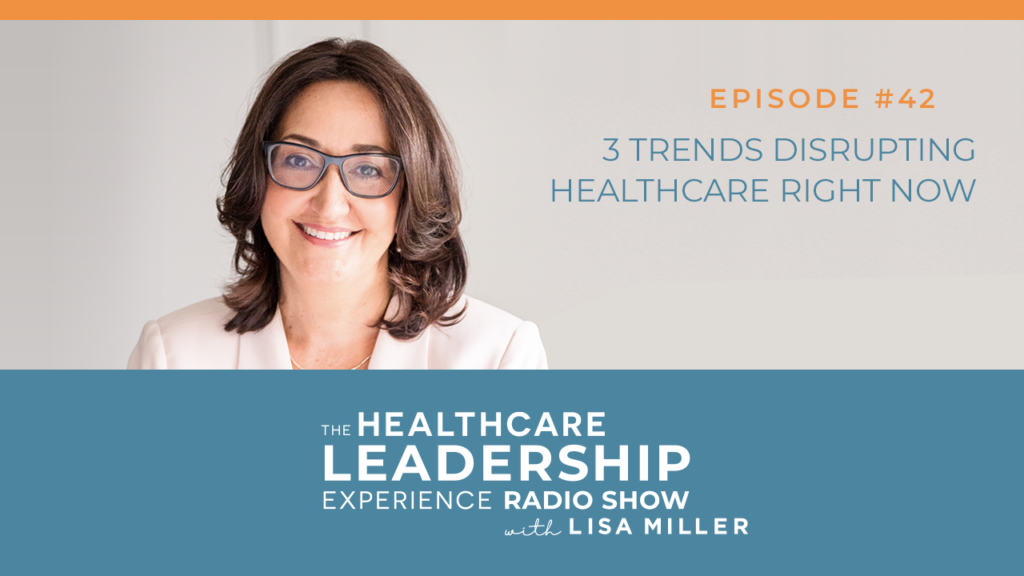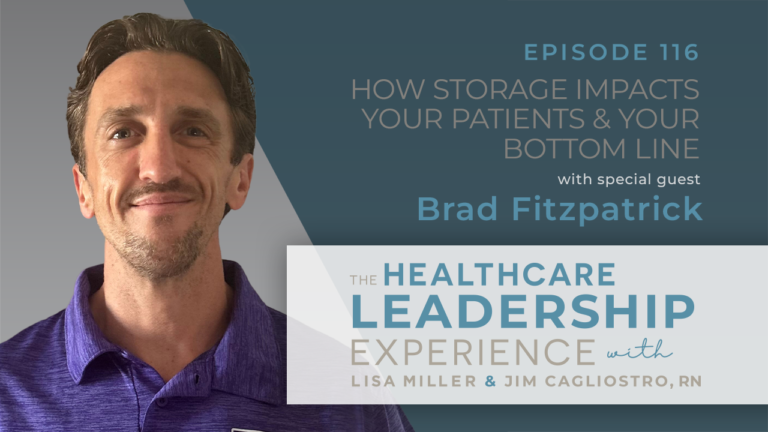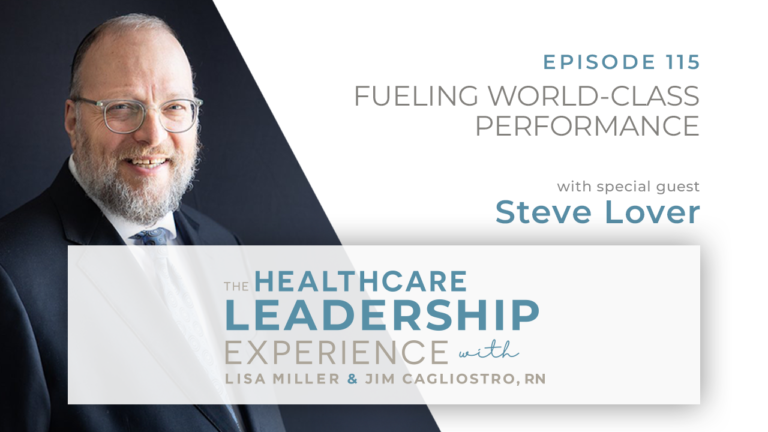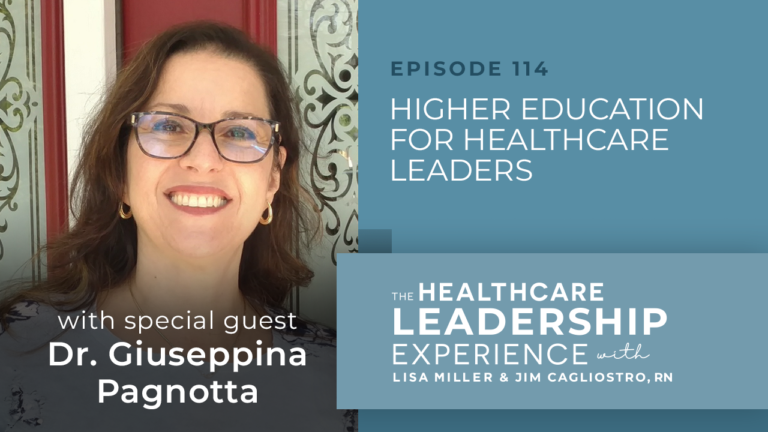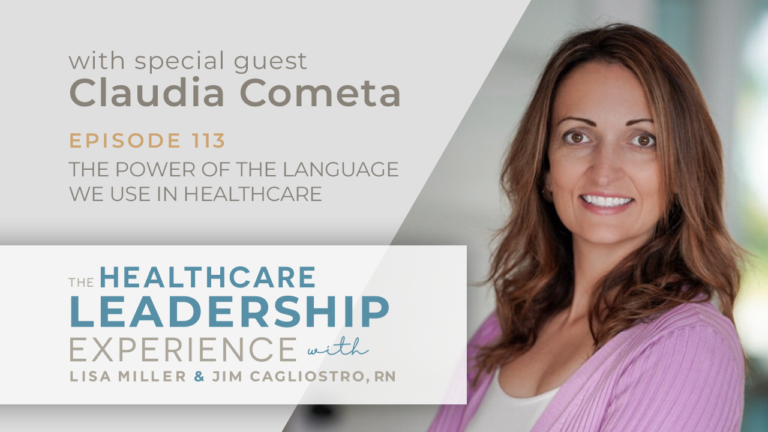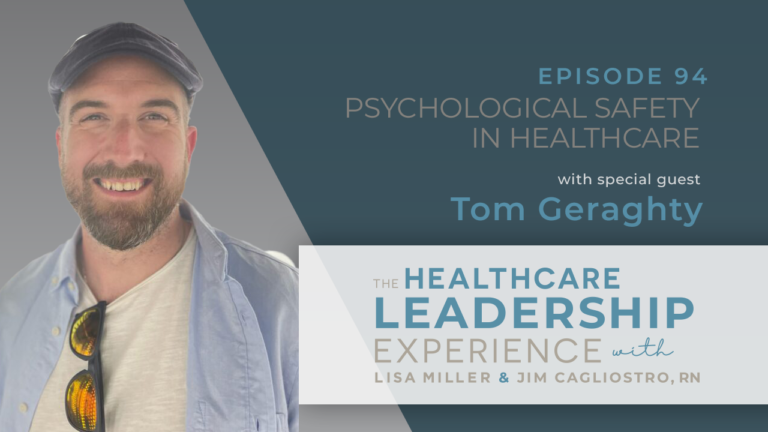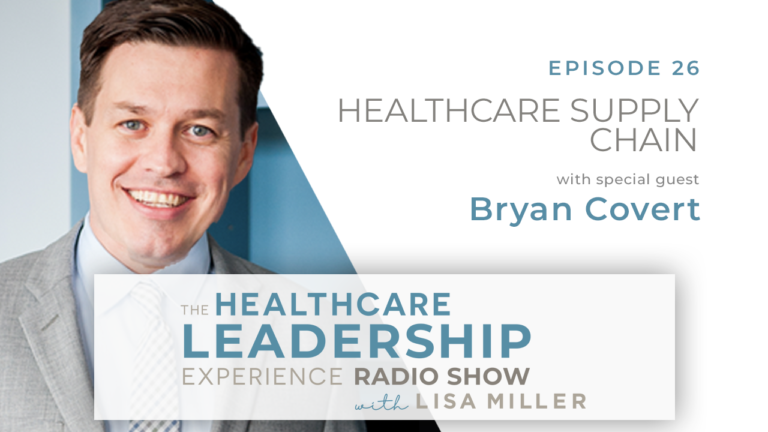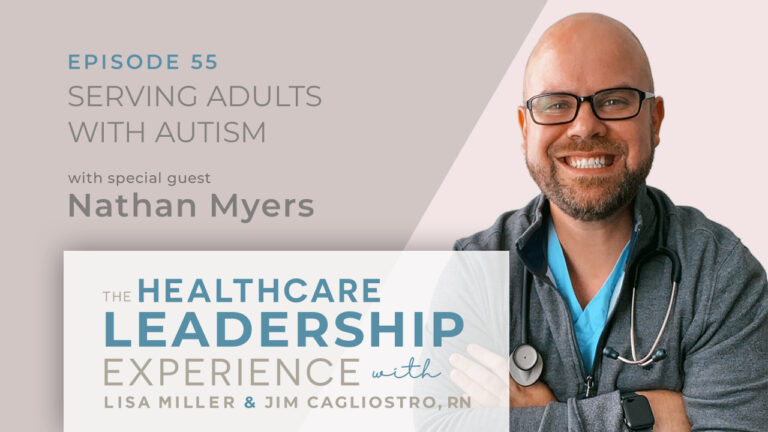The Multi-Trillion Dollar Opportunity
In Episode 42 of The Healthcare Leadership Experience, Lisa is joined by her show producer Lisa Larter to discuss 3 trends disrupting healthcare right now.
As Lisa Larter comments, ‘’The healthcare industry is ripe for disruption right now, and that requires a different way of looking at all aspects of patient care, medicine, diagnostics, rapid testing, you name it. If healthcare institutions continue to do things the same old way, then someone else will disrupt the industry and the old way will be left behind.’’
This episode is sponsored by VIE Healthcare Consulting® which has proudly helped hospitals save $772 million since 1999.
In This Episode You’ll Hear:
- Welcome to ‘’Amazon-ageddon’’; how the tech industry is disrupting healthcare by seizing a trillion dollar opportunity and bringing the pharmacy to the patient’s doorstep.
- Anticipating the next step; moving into the elder and uninsured market, ‘’I think it’s going to impact hospitals, again, because I think they’re relying on these relationships, those JV relationships or those partnerships, when they themselves should be the force that disrupts.’’
- Learning from Alexa; why healthcare providers have to think about how to better serve their patients – and why they need to get obsessed with the patient experience.
- The multi-trillion dollar opportunity; how diagnostics offers a great way to increase revenue.
- Why it’s possible for hospitals to adopt a two-pronged approach, ‘’You could have saving lives and surgeries having great outcomes, but you could also have this great community hospital and health system.’’
- Two key areas for all hospitals to explore:
- From med packs to home delivery; how to look at pharmacy in a more innovative way.
- Strategies to create a profit arm specializing in diagnostics.
- Why there’s no reason for any healthcare organization to suffer with low margins.
Discover another new perspective on cost management, listen again to Episode 41 – Zero-Based Budgeting.
What To Do Next:
- Subscribe to The Cost Advantage for Healthcare Leaders and receive a special report on 15 Effective Cost Savings Strategies
- Learn more about the simple 3 step process to work with us.
- If you are interested in learning more, the quickest way to get your questions answered is to speak with one of our margin improvement experts. Schedule a call with our team.
Connect with Lisa:
📱 https://www.linkedin.com/in/lisamiller/
Episode Transcripts
CLICK HERE TO DOWNLOAD THE PDF TRANSCRIPT
CLICK HERE TO OPEN THE TRANSCRIPT
Introduction (00:02):
Welcome to The Healthcare Leadership Experience Radio show with your host, Lisa Miller. Lisa is an entrepreneur, inventor, advisor, and founder of VIE Healthcare Consulting, the leading healthcare advisory and analytics firm, helping hospitals accelerate their margin improvement goals.
Lisa loves to think differently and collaborates with leaders and their teams to solve challenges and to create new innovative approaches that impact the clinical and business side of healthcare.
Our show will bring you leaders and innovators within healthcare and across multiple industries. Be a part of the discussion that will give you a unique perspective, deep insights, and roadmaps to successfully help you navigate the clinical, financial, and operations of healthcare. Your show starts now.
Our show will bring you leaders and innovators within healthcare and across multiple industries. Be a part of the discussion that will give you a unique perspective, deep insights, and roadmap to successfully help you navigate the clinical, financial, and operations of healthcare. Your show starts now.
Lisa Miller (00:49):
Hello. You’re listening to The Healthcare Leadership Experience Radio Show on HealthCare Now Radio. I’m your host, Lisa Miller, and today I’m joined with our producer Lisa Larter. Welcome, Lisa.
Lisa Larter (01:02):
Thanks, Lisa. Thank you for having me back for another show.
Lisa Miller (01:05):
Yes, exciting. Two weeks in a row and I see lots more shows in our future for 2022.
Lisa Larter (01:11):
I look forward to it.
Lisa Miller (01:13):
So, today, we’re going to be talking about a really interesting topic. It’s one of my favorite, and I think it’s one of yours as well. It’s healthcare disruption — but with a twist. It’s healthcare disruption, the patient experience, and what hospitals can learn from corporations that are making money with healthcare trends. So it’s an interesting mix of three trends and topics.
Lisa Larter (01:37):
For sure. Lots going on there. That’s for sure.
Lisa Miller (01:40):
Let’s start with Amazon. You, for the last year plus, have been sending me emails, text messages talking about how I should be paying more attention to Amazon and what’s going on in the pharmacy. Since you have been pushing that trend to me, I want you to talk a little bit about that and then we can continue with the disruption in healthcare.
Lisa Larter (02:08):
Well, I just think healthcare is experiencing…I call it the Amazon-geddon effect, right? Amazon is looking for ways to tap into the healthcare industry in any way they can, from creating their own group healthcare facilities and plans and pharmacy and testing and distribution that is far superior than what you see for typical pharmacies. I think they are a big risk. I don’t remember the names of the guys, but it’s not just Bezos.
Lisa Larter (02:41):
There’s a bunch of men from the technology industry that have a lot of money that have come together to kind of spearhead some of these initiatives. I think that anyone that doesn’t take what they’re doing seriously is almost operating with blinders on.
Lisa Miller (02:58):
Because you pushed me to really look into this space because I talk about it from a different perspective. I talk about it from diagnostics, and we talk about it from patient experience, but I started to do some research and what’s interesting, couple of things. It’s a trillion-dollar opportunity, right? But Amazon bought the start-up, PillPack in 2018 for $750 million, which is just extraordinary. At the time, PillPack was doing about $299 million in sales. What’s unique about PillPack is that they really were able to create a packaging system for pills in every single state.
Lisa Miller (03:35):
They really had solved the problem or the ability to provide a PillPack service nationwide, right? I’m going to take a step back. I’m going to use a personal example. My mom has not a lot, but let’s say maybe 12 pills throughout the day. I would go to the regular, the big Walgreens, CVS to fill hers and she would too. She was kind of doing her own pills. It’s tough for seniors. They get the trays and they put them in the trays. But I got very nervous after my mom had a stroke and I was putting her medicines in AM, PM. I felt like, what if I made a mistake?
Lisa Miller (04:11):
That could be really devastating. I went to our local pharmacy for just a different reason. And on the front, as a retail, local pharmacy, they had these packs of pills. I saw it when I go in and I thought it would be too hard to do. Everything in my head, we don’t like change, but I finally went in, because I talked to the pharmacist. I’m like, “Can I talk to pharmacist?” And he came out and I’m like, “Well, how complicated?” He’s like, “No, just bring your prescriptions and we do the rest.” And that’s been like three and a half years, maybe four years.
Lisa Miller (04:43):
My mom gets a box every day. I have packs in a morning at different times, a matter of fact, 7:00 AM, 1:00 PM, 6:00, 7:00. Every pack has a time and it lists the medicines. It’s great. Now, the reason why I went through that whole story is PillPack as a company is brilliant and Amazon buys PillPack and this trillion dollar opportunity. Everyone thinks I can’t get into this anymore because Amazon is in this space. I have a local pharmacy who is giving out these medication boxes. I tell everybody about it, and I think it’s brilliant.
Lisa Miller (05:20):
My idea behind this, and I want to talk a little bit more about your thinking, is I know that hospitals are partnering with Walgreens and CVS. They’re all kinds of JVs and they’re working through the ways that they can rightly so have some revenue from this pharmacy spend and really help patients be able to take their medication to track it. But I think it’s going to be disrupted. I think Amazon’s going to disrupt CVS and Walgreens.
Lisa Larter (05:49):
Absolutely. They’re going to become the next bookstore, because they actually think that people won’t stop coming to the bricks and mortar store to get their prescriptions. But the truth is, when you’re sick, the last thing you feel like doing is going to the pharmacy to get medication, and Amazon’s got same day delivery now in most major cities. And if not, next day delivery in most non-major cities. This whole pandemic has actually trained people to stay home when you’re sick.
Lisa Larter (06:20):
And guess what? Amazon’s got you covered. And guess what? Amazon isn’t charging you the premium fee that a service like Instacart charges you when you buy your products from them. It’s a huge risk for pharmacy right now.
Lisa Miller (06:34):
Huge. And like you said, let the pharmacy come to you, right? They are bringing the pharmacy right to your doorsteps. And what I didn’t know, which I’m so grateful that you pushed me to do this research, is that Amazon is helping show their customers clearly what the pricing will be. The big pain point for people is not understanding the pricing. If you’ve got clarity with everyone’s budgets and particularly with older Americans, if you can get clarity around what you’ll spend, they’re providing this transparency, it’s amazing.
Lisa Miller (07:08):
There’s a study here. According to a study published the National Library of Medicine, approximately 25% of older adults on a fixed income have delayed or non-filled medications due to their higher cost. In addition, the pandemic has cost millions of people their jobs and in theory their health insurance coverage. So this whole population of maybe 29 million non-elderly uninsured individuals is significant, and Amazon wants to address both of those population, the older adults, the uninsured, or maybe the underinsured, and they’re going to do it.
Lisa Miller (07:44):
I think this population, maybe not the elderly so much, but maybe the under or the uninsured, hospitals have shied away from. Now, Amazon is going towards those and they can. Not only do they make it easy, they can deliver to your door. I mean, how many of us had frustrating conversations at CVS or Walgreens, the big box, whoever it may be. That’s why I go to a local community pharmacy. I know my pharmacist and it’s easy. He gives me this medication box, but I think Amazon’s really going to disrupt this.
Lisa Miller (08:17):
I think it’s going to impact hospitals, again, because I think they’re relying on these relationships, those JV relationships or those partnerships, when they themselves should be the force that disrupts.
Lisa Larter (08:31):
They should or they should be partnering with Amazon. Amazon should be part of their distribution strategy because Amazon has it figured out. And so instead of you dealing with it, why not just get paid based on the uploading of the prescriptions and the fulfillment through Amazon. They could literally print money without needing to hire people to do any of the work.
Lisa Miller (08:52):
That’s really smartly said. I mean, you think about how many businesses or people have made money just by using Amazon as their platform. Not only that, there’s books written about how to use Amazon to sell on Amazon. You’re absolutely right. Maybe that’s the disruption for hospitals to partner with the big giant.
The most interesting also in my research that the Aetna former COO was speaking about Amazon and basically… Well, listen, they’re not only looking this from a trillion-dollar opportunity, but what he said is PillPack, but it wasn’t necessarily all about the pill.
Lisa Miller (09:28):
He said it was about getting into the home with Alexa where they can learn more about what to do to provide health. Now, you think that’s alarming, right? Alexa’s going to learn. How many times have been said in your house, and then you like open up your phone and all of a sudden it pops up. But think about their mindset, right? If we, as healthcare providers, were so interested in learning more how to provide health, you wonder what we would be doing better to serve our patients. To me, that was the gem, right?
Lisa Miller (09:59):
Obviously they want to get into a trillion dollar marketplace, but they really want to understand what other ways that they can provide healthcare. I think they’re right, because what goes on in the home, whether it’s caring for your family or is food and issue, what are the different issues, and they’re going to learn a lot about what goes on in the homes. I think that’s also a very disruptive mindset.
Lisa Miller (10:21):
I think if we had more of that curiosity and insight about what goes on in the homes of our patients and in our communities, there’s probably more problems we could solve and be helpful.
Lisa Larter (10:32):
Well, if hospitals were as obsessed with patient experience, as Amazon is with customer experience, that in and of itself would create massive opportunity.
Lisa Miller (10:44):
It’s surprising we’re still talking about this to some degree, right? I mean, you and I have audit discussions about enhancing the patient experience. But somehow, or another, these large corporations do it. They great patient experience, or they are putting in innovative ways to connect with the patients or to reduce wait times. There’s concierge medicine. There’s PE companies getting into a space. Why is it that there’s so many people running into the healthcare space?
Lisa Miller (11:15):
We think maybe the hospitals and health systems are like, “Oh, there’s a nothing I can do. Wait time is wait time. It’s just part of the process.” I don’t think it is. I would challenge the ER wait time. You and I just had a conversation about a four-hour wait time.
Lisa Larter (11:28):
I think it’s very similar to what you talked about with zero-based budgeting. Zero-based budgeting requires a distinctly different way of looking at how you do things. And I think the healthcare industry is ripe for disruption right now, and that requires a different way of looking at all aspects of patient care, medicine, diagnostics, rapid testing, you name it. And if healthcare institutions continue to do things the same old way, then someone else will disrupt the industry and the old way will be left behind.
Lisa Larter (12:07):
It really requires true innovative thinking and leadership to change an industry that has been around forever.
Lisa Miller (12:17):
Yeah, absolutely. It’s been around forever and hospitals are closing. I don’t think there’s a reason why any hospitals should close. Absolutely none, particularly when this is such a big marketplace. People are putting money out of pocket, whether it’s just being more on the financial side, or it’s looking for innovative ways. And right after our quick break, we’re going to talk about diagnostics. I’ve been talking about diagnostics as a way for hospitals to have this non-typical non-traditional patient care revenue, right?
Lisa Miller (12:50):
There’s a lot of companies that have been around for years. They offer three or four or five, six different tests. You can go to a location. It’s kind of like a pop-up diagnostic center. It’s $139, $189, and that’s a multi-hundred-million-dollar business. And there’s so much now emerging.
Lisa Larter (13:10):
COVID at home rapid testing.
Lisa Miller (13:12):
Yeah, exactly.
Lisa Larter (13:13):
Over the last two years, we have educated people on how to do rapid testing at home. Why not buy your test on Amazon and test at home? It used to be go to the hospital to get that test, right?
Lisa Miller (13:24):
I think that’s coming.
If you’re just tuning in, you’re listening to The Healthcare Leadership Experience Radio Show on HealthCare Now Radio, and I’m your host Lisa Miller. Today, I’m joined with Lisa Larter, who’s our producer, and we’re talking about healthcare disruption, patient experience, and maybe ways hospitals can add to their revenue by looking at trends.
This show is sponsored by VIE Healthcare Consulting, the leading healthcare advisory and analytics firm, helping hospitals accelerate their cost savings and margin improvement goals since 1999. You can learn more about VIE Healthcare at viehealthcare.com.
Lisa Miller (13:58):
So, on the second half of the show, I wanna talk about diagnostics because diagnostics is really interesting, right? You can do diagnostic scans, diagnostic blood tests, saliva tests. There’s a whole full array of diagnostic services. We’ve had executive health exams, but I feel like they might miss a population just by what they call it, right? What if you’re not an executive, but you still want to have a health exam like that, thorough? But we’ve had it around for a long time.
Lisa Miller (14:30):
There’s new ones kind of popping up in different places. I just think and I’ve had discussions with people over the years, because of the nature of what a hospital does, they do the exams, they do these diagnostics, they’re doing lab tests, because of their experience in this field and their authority in the community, they are ripe to take these models. These companies that are investing multimillion dollars that are looking at pulling in these same tests the hospitals have access to and creating a bundle, or a program, and then selling it 100% out of pocket.
Lisa Miller (15:09):
The hospital should be looking at this market to say, “Wait a minute, I want to do this in our community. I want to make this accessible to executives or regular, just the middle class people who they may spend a thousand dollars a year on a full body MRI or a full cancer screening, a blood test,” but hospitals need to be doing this. This is the place they should be doing it because the marketplace is already there.
Lisa Larter (15:33):
It’s a great marketing opportunity for hospitals, and they’ve already got the infrastructure built in if they would start marketing it to the right people. I bet you here are a lot of people that don’t even know that they can go for cancer screenings and MRIs and all that kind of stuff.
Lisa Miller (15:49):
Even if you look at early cancer detection, Lisa, there’s so many cancers that can be detected early. In fact, there’s one out in the marketplace that’s been there for a little bit now. The simple test screens for over 50 types of cancer, of which 45 lack regular screening tests today. Only five we get screened for regularly. There’s 45 that we don’t. And as everybody knows, early detection saves lives, right? I mean, if you can detect something in a stage one state, the outcomes and the survivability and just your overall health, the outcomes are just significantly better.
Lisa Miller (16:30):
There are a couple of the things I think hospitals should be looking at, right? Could they offer early cancer detection? Really sell that as a standalone. There’s a company I believe called Larry. They partner with hospitals and even individuals can reach out to them. But hospitals partnering with companies that have really been innovative in terms of their diagnostic testing. If I’m a hospital, I’m looking at maybe a standalone cancer detection. I am pushing that out to my community. It’s outside of insurance.
Lisa Miller (17:05):
Just like these companies are selling these programs, the hospitals can do the same thing. Again, we’ve got organizations like the Cleveland Clinic. They have an executive health exam, but these hospitals can offer programs like a full body MRI, maybe two or three kind of different tests that they push out. And because they are the community authority, they will get patients coming in paying out of pocket for diagnostic tests. There’s no question. It’s a multi-trillion dollar business now.
Lisa Larter (17:35):
Right. But the problem is a lot of hospitals are behaving like firefighters instead of fire prevention specialists. And so if all you do is fight fire, then you don’t have time to think about prevention because nobody wants to hear about fire prevention when their house is burning down. Healthcare has really become the house is burning down. What healthcare needs to become is how do you prevent your house from catching fire to begin with? That’s the kind of thinking they need.
Lisa Miller (18:06):
Absolutely. But I think what happens is, is that their core business or their core mission is that patients coming in, right? It’s saving lives, surgeries. It’s that typical approach versus moving that to prevention, detection, maybe helping with performance. You could have both. You could have saving lives and surgeries and having great outcomes, but you could also have this great community hospital and health system that’s saying, “Listen, come to us for,'” like you said, “fire prevention.
Lisa Miller (18:43):
“Come to us”, that we can help you detect anything that may be going on. More than likely since you live in the community, you probably would come here to help with any problems.” Right? These people are flying all over. They’re flying to different parts of the country, flying to different parts of the world and really, frankly, getting tests and diagnostic tests that any hospital could do.
Lisa Miller (19:05):
They don’t need to spend the amount of money that some of these companies and some of these organizations are putting together, and they’re backed by PE companies, private equity, and they’re making a ton of money. Why can’t hospitals have a two-prong approach?
Lisa Larter (19:20):
Well, they could, but somebody needs to lead it. Again, Lisa, it’s all about that. Innovative thinking. It reminds me of when I lived in Nova Scotia and I paid for one of those executive healthcare assessments. I paid thousands of dollars for it. When I got my report and I went to see my family doctor, he was a little dismissive like, “Well, we could have done that here,” but nobody was offering to do that there.
Lisa Larter (19:43):
Nobody was making it easy for me to have everything done as a one stop shop. Hospitals needed to start thinking about the competition and what they’re doing. These companies are making a lot of money, which shows that there is a demand for it. If you don’t get involved in that demand, you’re going to miss out on the opportunity.
Lisa Miller (20:02):
Yeah, absolutely. I as — whether it was in strategy or some part of the organization in a hospital, I would be looking at these other companies. In the light of competitor search, they would be looking at other hospitals as their competition. They’re always looking at where are patients going. If they’re not coming here, where are they going? Hospitals have a lot of marketing initiatives so that patients come to their hospital for those high profitable cases, orthopedics, spine, cardiac. They’re looking at the competition trying to get the surgeries and for them to use their health system.
Lisa Miller (20:37):
Hospitals should be doing the same thing as all these companies that are offering these health exams, diagnostic tests. I would be looking at the whole marketplace saying, “We can take this, this, this, and this, bring it in, have a program. We’ll name it, right? It’s ours. We claim it. And then we push it out to the marketplace, and we make it easy.” And now patients are coming or communities coming and we help preventing disease or capturing and predicting, and we’re doing really what our health insurance companies want us to do, and even Medicare.
Lisa Miller (21:10):
Who knows? There could be interesting partnerships, funding partnerships. Making a program, creating it, and making it financially accessible, right? You don’t have to have a $20,000 program or a $15,000 program. What if they were like starting at a thousand dollars and maybe you capped it at four or five thousand, because hospitals could do it because they have the equipment already. You don’t have to fund new equipment.
Lisa Larter (21:35):
Exactly. It could be a step up, right? Here’s the initial baseline diagnostics that you need. And then based on those results, you decide if you want additional testing diagnostics done. There’s so many ways that this could be approached for the health-conscious person who really wants to be proactive in terms of taking care of themselves. As a society, we’ve never been taught to do that.
Lisa Miller (21:59):
We haven’t been taught to do that. Unless there’s been somebody who’s talking about or we learn about it from a friend, we don’t know some of these things exist. I’m in healthcare and I’ve known for years the diagnostic capabilities. Years ago, my mom had this repetitive cough, and I actually took her to one of those health exams in the city, in New York City. They did a scan.
Lisa Miller (22:22):
That’s interesting is I had the same reply to doctors when I brought the scan back, but we used that scan as a baseline to this day because we saw some spots and they thought it was when she was younger. But I paid out of pocket for that scan, and that was probably 20 years ago. These things have been going on for years. This is not anything new, but hospitals need to pull a program together. What are the three or four things that matter the most, right? And what can we offer to the community? What can we educate?
Lisa Miller (22:52):
Make it accessible and then maybe even offer financing solutions. I mean, you’ve got things like a firm or all those other programs where if the patient can get… Or the hospital can say, “Listen, we have a four-pay option,” right? Make it easy to buy from. And what’s so brilliant about hospital having this arm, they can attach it to concierge services. And then if the patient does need care, well, then they would go right into getting care at their hospital.
Lisa Miller (23:20):
What a great competitive advantage for a hospital to have a program where they’re really providing diagnostic testing and they’re doing it in unique way, having the patients come to the hospital more often. It becomes a source of familiarity, right? Not only when it’s painful or there’s something else attached to it, right?
Lisa Larter (23:40):
Exactly. It’s a huge, huge opportunity.
Lisa Miller (23:44):
I’ve really enjoyed this conversation, Lisa, and there’s probably a lot more to it, but we got to wrap up. But I think there’s a couple of things that hospitals can think about as relates to this podcast and our conversation.
I think number one is, how do you look at those companies like Amazon? And to your point, do you partner with an Amazon, or do you have a local approach, like that local pharmacy that I work with? I mean, how do you look at pharmacy differently? I do think it’s going to be disruptive.
Lisa Miller (24:10):
I think that revenue, even if they’re working with a JV or some kind of partnership with a larger box chain, is going to change. Why not spend the time to look at how they can look at pharmacy differently? Because I think there’s lots of opportunities, whether it’s medication packs, whether it’s delivering to the patient home. How can you connect to your community and offer value adds? I think that medication box is the platform. Number two, I think the other area is really this diagnostic area.
Lisa Miller (24:41):
How can hospitals bring in a way that they create a for-profit arm and look at diagnostic testing, again, whether that’s a full body MRI, which is a really important test to see if there’s anything going on? Hospitals can offer that cheaper than anybody can, right? Certainly out of pocket though. Number two is, there some lab testing, saliva testing? Look, people are going out to 23andMe. Like you mentioned, COVID test. I mean, what can hospitals do? Build a program. Make it easy. Reach out to different companies that are cutting edge.
Lisa Miller (25:15):
Look what your competitors are doing. Look what the market is doing. Create a program. You can reach out to me. We’re working with hospitals and really helping them to think differently, and I think that’s the uniqueness at VIE is that we see what’s going on in the marketplace and we can bring those innovations or that thinking in different ways to hospitals. They’re taking advantage of this large healthcare marketplace.
Lisa Miller (25:39):
There’s no reason why healthcare system or hospital has to suffer with low margins, when there’s large companies like Amazon, investors and PEs, that are getting involved in the diagnostic world. Why does this hospital have to have a low margin when there’s such high margin opportunities available to them? That’s my message to everyone.
Lisa Larter (25:59):
I agree. Take advantage of the opportunities and you’ll actually improve your patient experience.
Lisa Miller (26:05):
Absolutely. Because they’ll feel like the hospital is that full-service provider of care. They’ll know that their hospital is on the cutting edge. They don’t have to travel. They can really use their hospital as that full experience.
So I want to thank you, Lisa, for being on the show again this week.
Lisa Larter (26:23):
Thank you for having me.
Lisa Miller (26:25):
I am looking forward to lots more shows with you and your perspective. You really have a unique view of healthcare, which I enjoy and I know our listeners enjoy. We appreciate you being on the show very much.
Lisa Larter (26:35):
Thank you for having me. It’s always a pleasure.
Lisa Miller (26:37):
Thank you for listening to The Healthcare Leadership Experience Radio Show on HealthCare Now Radio. I’m Lisa Miller, your host. Please join us every week on HealthCare Now Radio at 5:00 AM, 1:00 PM, and 9:00 PM, and other podcast apps. If you’ve got a topic or a subject that you would like us to discuss, please reach out to me. I’m on LinkedIn. I’m also available, you’ll see my email on the show notes. We’d love to continue the is discussion in person, so please do reach out to me. Thank you.
Outroduction (27:06):
Thank you for joining Lisa Miller for this episode of The Healthcare Leadership Experience Radio Show sponsored by VIE Healthcare Consulting. If you enjoyed the show, subscribe so you can automatically get notified when new shows premier weekly.
Don’t forget to leave us a review so more healthcare leaders like you can discover us. This show is on HealthCare Now Radio, Apple Podcast, Stitcher, Spotify, Pandora, and other major podcast platforms.
To reach out to Lisa personally, you can join the conversation on LinkedIn, where Lisa continues to have discussions on the business of healthcare. You can find links to Lisa’s other social platforms in the show notes or at viahealthcare.com.
The Healthcare Leadership Experience Radio Show is the think differently communication for healthcare leaders, and we are honored to have you tune in.
Join us next week for another episode of The Healthcare Leadership Experience Radio Show.
